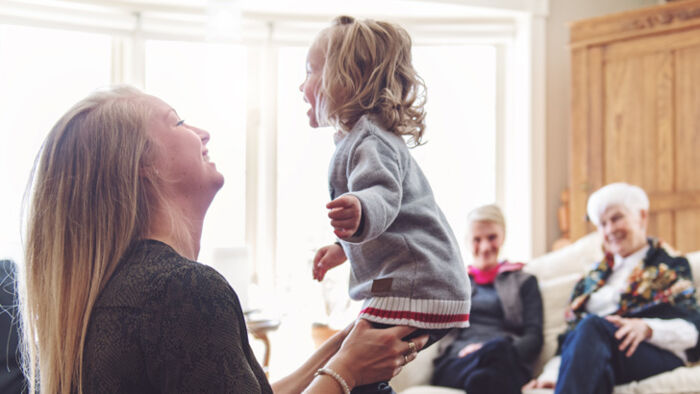How to cope when you're caring for young children and ageing parents
By Nicola Field
If you're worried about the cost of raising kids, building your super and paying off the mortgage, don't be. A far bigger issue could be looming.
Brian Herd, the head of elder law at CRH Law and author of Avoiding the Ageing Parent Trap, predicts the biggest factor that could impact your happiness in later life might be your parents.
People aged in their 40s and 50s may be facing a ticking time bomb as the looming needs of older parents compete with the demands of a young family.
Adding to the financial and emotional load is an increasing trend for adult kids to live at home for longer or move back home due to the rising cost of living.
Already an estimated 1.5 million Australians (mostly women) provide informal care for ageing family members. It's more than a juggling act. The "sandwich generation" needs to carefully plan ahead because every family member stands to lose if things don't work out.
Figures from the Australian Institute of Health and Welfare paint a clear picture of where the sandwich generation is at. On one hand, we're delaying having children: one in four new mums is aged over 35, including 5% who give birth aged 40-plus.
At the other end of the spectrum we're living longer: our 3.8 million 60-somethings have a life expectancy of 20-plus years.
It means adult children are seeing their parents experience what Herd describes as "frailty creep".
In addition, growing numbers of families are bypassing conventional care. Put off by the complexity, cost and poor reputation of aged care and the under-resourcing of home care, the sandwich generation is opting to care for ageing relatives themselves. "It's like Custer's last stand," says Herd.
"Families are left to look after their own."
While caring for older relatives is often an act of love, it can easily turn pear-shaped without planning.
But as Herd points out, "Australians have a cultural aversion to looking into the future and planning ahead, especially when it comes to family matters."
Without plans in place, families can quickly find themselves thrown into crisis management mode.
Add in the complexities of blended families, with multiple sets of aged parents, and Herd says "it's no coincidence we are seeing more litigation between family members stemming from issues around the care of ageing parents".
Don't become the 'martyr child'
For all that, the royal commission into aged care showed only 5% of older people live in formal accommodation like nursing homes. The vast majority want to remain in their own home (and most do so).
That sees the burden of care fall on families and for the sandwich generation, with plenty of moving parts to manage, this can take a heavy financial toll.
Most carers spend an average of 20 hours a week looking after a loved one. That means less time to devote to a career. And with little or no government support, carers have a median weekly income 42% below those of non-carers.
Herd believes this has contributed to the so-called martyr child - an adult child who agrees to look after an ageing relative without immediate recompense. When the parent passes away, that same child may demand a bigger inheritance as compensation for taking care of mum or dad.
That's when things really start to heat up. Siblings can wind up in court fighting one another over a parent's will and, as Herd notes, "these cases can drag on for years". Meanwhile, the mounting legal fees can add up to hundreds of thousands of dollars.
"Older parents need to be attuned to these issues," cautions Herd.
"One solution is for seniors to alter their will to recognise the contribution of a child who provides care. It really comes down to families preparing for the future - and ageing parents need to understand the implosive consequences of not making plans. The impact can go well beyond their own lives."

Consult a lawyer
Ensuring older parents have an enduring power of attorney (EPA) in place is a critical step, says Herd.
The document allows seniors to appoint a person (or more than one) to manage their finances and make legal and financial decisions on their behalf if they can no longer make those decisions themselves.
"Money is a sensitive issue even in families," says Herd. "Without an EPA in place, if an ageing parent has a stroke, no one can make financial decisions on their behalf, and adult children will need to apply to a guardianship tribunal to be appointed to make decisions for them."
The laws around drafting an EPA vary between states, but Herd recommends seeking professional advice.
"Situations where several adult children share enduring power of attorney may sound inclusive, but this can create plenty of problems if siblings can't agree on issues.
"A lawyer can recommend a sensible approach, including adding clauses [stipulating] that the child holding power of attorney must keep the other siblings informed about their decisions. This can prevent one adult child helping themselves to their parent's money - something that may only come to light after the parent dies."
Multi-generational revival
In past generations, multi-generation living was common. And it's something we're returning to in droves spurred by a multicultural society and rising property prices.
A McGrath report found Sydney and Melbourne have experienced a 30%-plus uptick in the number of families sharing multi-gen homes over the past decade.
Submissions made to the royal commission into aged care show many Australians welcome the prospect of living in a multi-generational setting. These arrangements can be a financial minefield, and it is the ageing parent, not the adult child, who can be left badly out of pocket.
Granny flats may seem like an ideal choice for multi-gen living, giving ageing parents proximity to adult children yet with an element of independence. And as for who pays for the construction, it's easy to assume adult kids will wear the cost. However, a Macquarie University Lighthouse report highlights a rising tide of informal "assets-for-care" arrangements.
This is where an older parent sells their home and hands over cash to the adult child, or transfers the title of their home to the child in exchange for accommodation and care.
According to Macquarie University associate law lecturer Teresa Somes, seniors can be at risk of
losing everything if circumstances change. This can happen through the breakdown of relationships, events such as divorce, or the increasing care requirements of the older person which the adult child can't fulfil.
Assets-for-care arrangements tend to be informal despite involving the transfer of major assets.
Everyone simply assumes it will all work out because it's family. But if things don't go to plan, older parents can find themselves out on the street.
Somes cites a NSW Supreme Court case where an elderly woman ended up couch-surfing with friends after the relationship with her daughter and son-in-law soured, and she was asked to leave the home to which she had contributed nearly $170,000. Disastrous outcomes like this don't just leave aged parents facing a bewildering legal system.
According to Somes, a three-day hearing in the Supreme Court can cost in the vicinity of $90,000 to $130,000.
CRH Law's Herd says the abundant potential for things to go badly wrong makes it crucial to have a formal family agreement drawn up to spell out how the entire arrangement works. "There is no substitute for having an arrangement in black and white on paper," he says. Siblings who aren't party to the agreement should at least formally endorse it.
Family agreements can be complex - it can cost $3000 to $4000 to have one prepared by a lawyer.
But as Herd points out, "there can be significant consequences if things don't work out, and the
cost of doing nothing can exceed the price of taking action".

Downsizing's downsides
On the face of it, downsizing can be a solution that lets older parents enjoy independent living, reduced home maintenance and an opportunity to boost their superannuation. But it's not for everyone.
Research undertaken for the Australian Housing and Urban Research Institute (AHURI) by Curtin University and Swinburne University of Technology found over half the downsizers in their study moved to a home with three or more bedrooms. Only a third moved to an apartment.
Curtin University senior lecturer Amity James says the research shows that downsizing is not so much about moving to a cheaper, smaller home. Rather, it's about moving to a place that is more manageable at a later stage of life. The problem is that developers aren't building enough senior-friendly homes.
The financial picture can be complicated, too.
On one hand, over-65s can use the proceeds from the sale of their home to make a downsizer contribution to super of up to $300,000. If the home is owned as a couple, it could be $600,000.
There is no age limit on downsizer contributions, and adding $600,000 to a couple's overall nest egg at age 65 can see an uptick in household income of about $49,500 annually.
The crunch is that a bigger super balance can push seniors into the realm of self-funded retirees.
The AHURI report notes that the potential loss of the age pension and associated benefits is a real
concern for older Australians.
How best to "age in place"
Most seniors want to live in their own home for as long as possible. This may call for some age-appropriate renovations, or extra spending on outsourced services such as regular home and garden maintenance and even personal care.
The cost of home care can add up. The daily fee (from March 21, 2021) for a basic home care package starts at $9.72, or $136.08 fortnightly.
The cost can rise considerably depending on income and whether you're single or a couple. The federal government's My Aged Care website has a fee estimator that provides an idea of costs.
One option that can help seniors foot the bill for staying at home longer, without relying too much on adult children, is a reverse mortgage. It's a loan that lets you dip into home equity without any repayments until you sell or pass away.
While reverse mortgages are not new, they are offered by only a handful of lenders, and the cost is much higher than a traditional mortgage. Expect to pay 5.22% with G&C Mutual Bank, 5.4% with P&N Bank and 5.57% with IMB Bank.
Importantly, the interest meter starts ticking from day one. And without ongoing repayments, compounding interest charges can build up rapidly.
As a guide, take out a reverse mortgage for $85,000 (the current average amount) at an interest rate of, say, 5.25%, and after one year you'll owe $89,464. After 10 years, the balance owing will rise to around $141,800. (Calculations are from myagedcare.gov.au.)
That may not be a concern for families hoping to give senior parents a chance for independent living today. But it can come at the expense of quality aged care later.
That's because the refundable accommodation deposit (RAD) often needed to secure a place in aged care can run into hundreds of thousands.
Retirees using a reverse mortgage face the risk of having insufficient home equity to stump up the RAD once the reverse mortgage is paid off.
Be aware, too, that funds received from a reverse mortgage can impact age pension entitlements. This makes it essential to discuss the pros and cons of a reverse mortgage with family members and a specialist aged care financial adviser.
As Brian Herd notes, "family co-operation and engagement is the oil that greases the creaking engine of our older parents' lives".
Done well, a combination of good planning backed by legal and financial advice can help to preserve relationships across generations.
For the sandwich generation it can mean helping ageing parents grow old in style, while ensuring their own household's resources aren't too thinly stretched.
Get stories like this in our newsletters.



